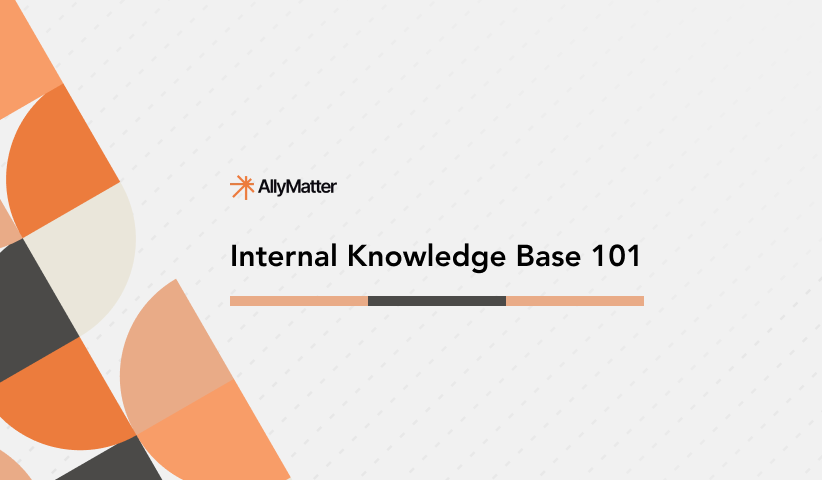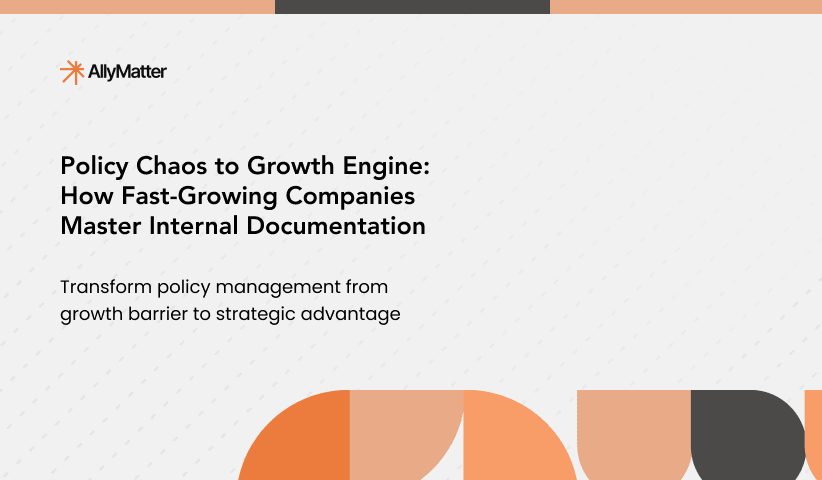Enterprise teams managing 50-1000 employees face distinct challenges when implementing knowledge management systems. Unlike smaller organizations that can rely on basic authentication methods, growing companies need robust Single Sign-On integration that scales with complex organizational structures while maintaining stringent security standards.
The stakes escalate significantly at enterprise scale. When your finance team struggles with authentication delays during month-end closing, or when HR managers can’t access critical policy documents during compliance audits, these aren’t minor inconveniences—they represent operational risks that directly impact business continuity and regulatory compliance.
This comprehensive analysis examines free knowledge base platforms that provide genuine enterprise-grade SSO capabilities, helping you navigate the complex decision between robust functionality and cost management constraints.
How to understand this guide
We’ve selected enterprise knowledge base platforms based on these critical evaluation criteria:
- Enterprise SSO integration: Platforms supporting SAML 2.0, LDAP, and OpenID Connect protocols rather than basic OAuth implementations.
- Organizational scalability: Solutions that handle complex hierarchies, department-specific permissions, and automated user provisioning.
- Security and compliance readiness: Platforms offering audit trails, data governance features, and enterprise-grade security controls.
- Implementation complexity: Balance between sophisticated capabilities and practical deployment requirements for enterprise IT teams.
- Cost transparency: True cost evaluation including hosting, maintenance, and technical resource requirements.
The platforms featured below represent solutions that provide enterprise functionality without traditional enterprise licensing costs, though they may require significant technical investment for proper implementation.
How enterprise SSO transforms knowledge management
Implementing enterprise-grade Single Sign-On for knowledge bases delivers transformative benefits that extend far beyond simple password elimination:
- Organizational security: Centralized authentication reduces credential-related security vulnerabilities while enabling comprehensive access monitoring and control.
- Operational efficiency: Seamless integration with existing identity providers eliminates authentication friction that typically hampers knowledge base adoption.
- Compliance alignment: Automated user lifecycle management and detailed audit trails support regulatory requirements and internal governance policies.
- Administrative control: Granular permissions and role-based access controls ensure sensitive information reaches appropriate personnel while maintaining information security.
Consider the transformation experienced by Martha, Chief Operations Officer at a 400-person healthcare technology company. Her team previously struggled with fragmented documentation across multiple systems, each requiring separate authentication. After implementing enterprise SSO with their existing Active Directory, employees could access operational procedures, compliance documentation, and training materials using their company credentials. This eliminated the average 15 minutes weekly spent on password-related issues while ensuring HIPAA-compliant access logging for all documentation interactions.
Also read: 5 Free SSO-Enabled Knowledge Bases for Small Teams
Popular enterprise SSO providers
Enterprise environments typically integrate with sophisticated identity management systems that support advanced authentication protocols:
- Microsoft Azure Active Directory: Comprehensive identity platform supporting SAML 2.0, OpenID Connect, and sophisticated conditional access policies for enterprise security requirements.
- Okta: Enterprise identity management solution offering extensive integration capabilities, automated user provisioning, and advanced security features like adaptive authentication.
- Active Directory Federation Services (ADFS): On-premises identity federation solution providing SAML and WS-Federation support for organizations with strict data residence requirements.
- Google Cloud Identity: Enterprise-grade identity platform with advanced security controls, organizational unit management, and comprehensive API access for custom integrations.
- Ping Identity: Specialized enterprise identity platform supporting complex authentication scenarios, API security, and sophisticated access governance requirements.
BookStack
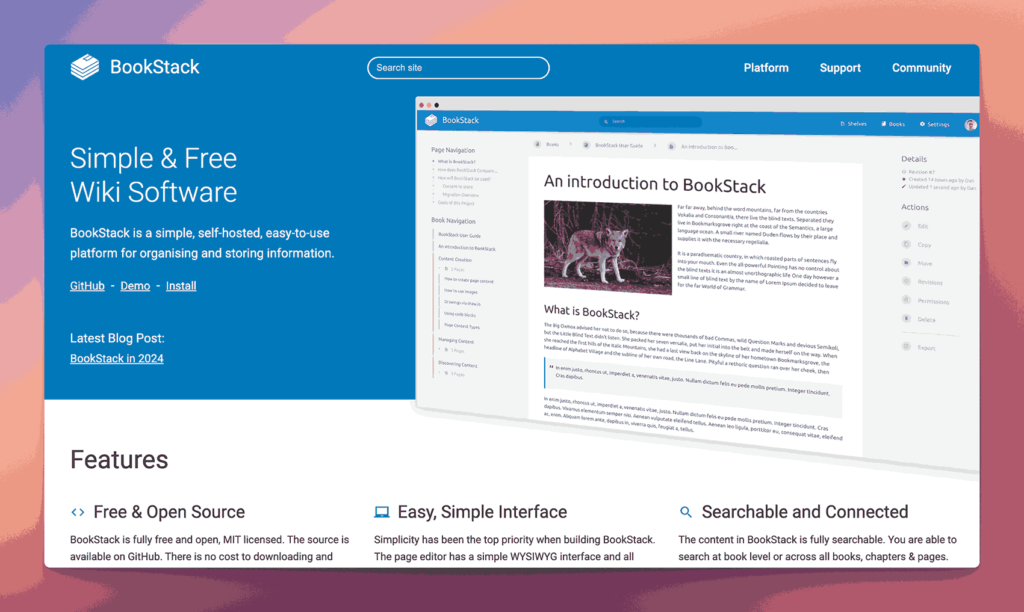
BookStack delivers comprehensive enterprise authentication capabilities through its open-source architecture while maintaining complete transparency in implementation costs and security configurations.
BookStack structures information using an intuitive “Books, Chapters, Pages” hierarchy that aligns naturally with enterprise documentation requirements, from high-level policies to detailed operational procedures.
Key information:
- Enterprise SSO options: GitHub, Google, Slack, and AzureAD SSO options available in the free version. SAML2, Okta, and LDAP require technical setup but are supported.
- Open source advantage: MIT License provides complete freedom for enterprise customization and deployment.
Why you might choose BookStack:
- Self-hosted deployment provides complete control over data residence and security configurations, essential for compliance-sensitive industries.
- Simple book-like structure makes it intuitive for enterprise teams to organize complex documentation hierarchies.
- Fully customizable with themes and branding options to match enterprise requirements.
- Active open-source community ensures continuous development without vendor dependency.
Potential considerations:
- Requires technical expertise for setup, configuration, and ongoing maintenance.
- Limited advanced search functionality compared to some commercial enterprise platforms.
- No built-in real-time collaboration features beyond basic editing.
Outline (Self-Hosted Community Edition)
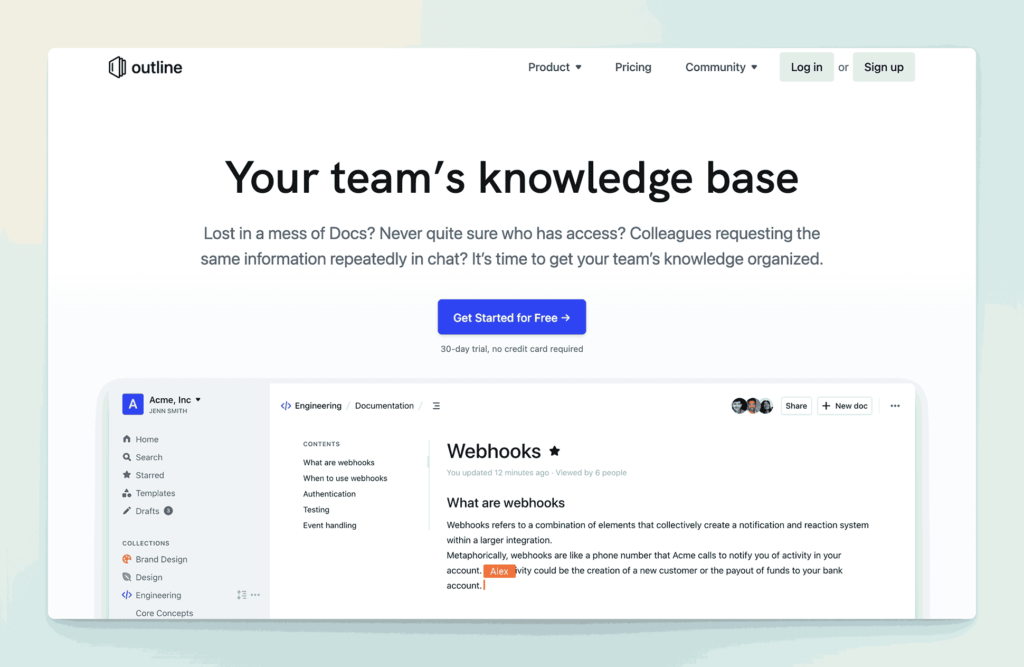
Outline’s self-hosted community edition provides enterprise-level knowledge management capabilities with sophisticated SSO integration, making it particularly attractive for organizations requiring complete control over their knowledge infrastructure.
Outline emphasizes collaborative knowledge creation through real-time editing, structured collections, and intelligent search capabilities that scale effectively with enterprise content volumes.
Key information:
- Enterprise authentication protocols: Supports SSO in the free community edition, but requires self-hosting for full control.
- Business Source License: Open-source with some restrictions, providing transparency while supporting commercial development.
Why you might choose Outline:
- Clean, user-friendly interface requiring minimal onboarding for enterprise teams.
- Real-time collaboration with advanced document categorization and powerful search capabilities.
- Integration with popular enterprise tools like Slack and Google Drive for streamlined workflows.
- Self-hosted deployment ensures complete data sovereignty and security control.
Potential considerations:
- Community edition requires self-hosting infrastructure and technical maintenance.
- Advanced features may be limited compared to the hosted commercial version.
- Limited customization options for complex enterprise-specific workflows without technical development.
XWiki (Community Edition)
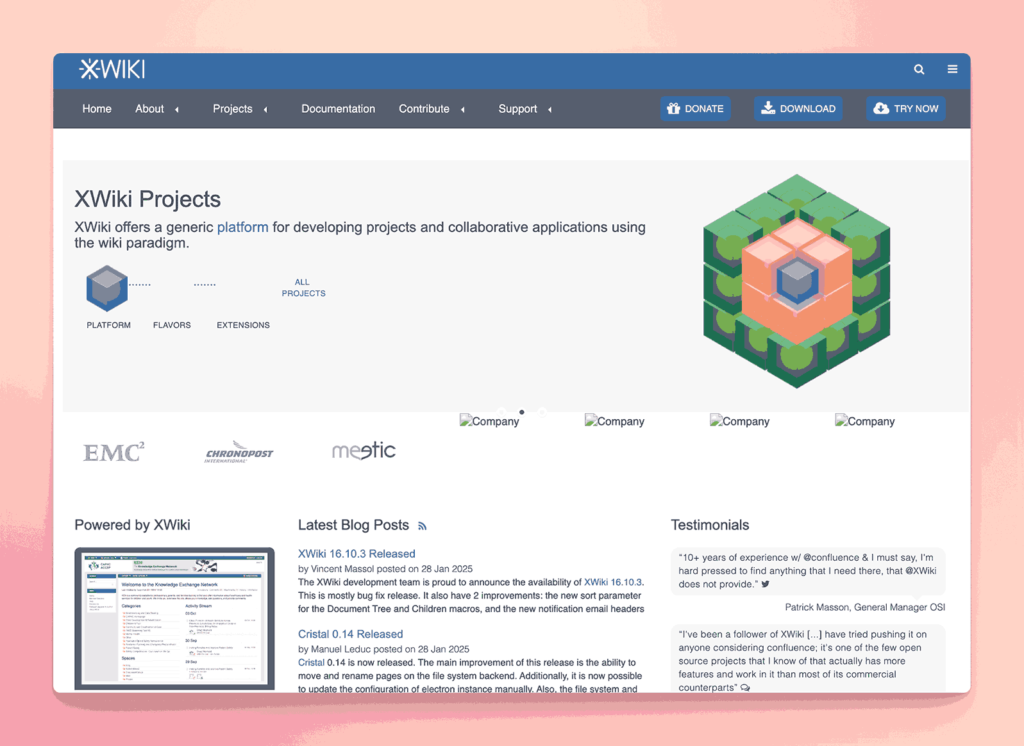
XWiki’s community edition delivers enterprise-grade customization and authentication capabilities that rival commercial solutions, making it ideal for organizations with specific compliance or integration requirements.
XWiki’s strength lies in its sophisticated extension system and powerful customization capabilities, allowing enterprises to create highly specialized documentation systems with custom workflows and integrations.
Key information:
- Enterprise authentication: Extensible authentication system supporting various SSO protocols through plugins and modules.
- GNU General Public License: Open-source license providing complete freedom for enterprise deployment and customization.
Why you might choose XWiki:
- Extensive customization capabilities through plugins and extensions for unique enterprise workflows.
- Robust permission system with fine-grained access controls suitable for complex organizational structures.
- Strong development community and active maintenance ensuring long-term viability.
- Self-hosted deployment with complete control over data and security configurations.
Potential considerations:
- Complex deployment requiring technical expertise in server administration and configuration.
- Learning curve for administrators due to advanced feature complexity and customization options.
- May be overwhelming for organizations seeking simple, out-of-the-box knowledge base solutions.
Slab (Limited Enterprise Features)
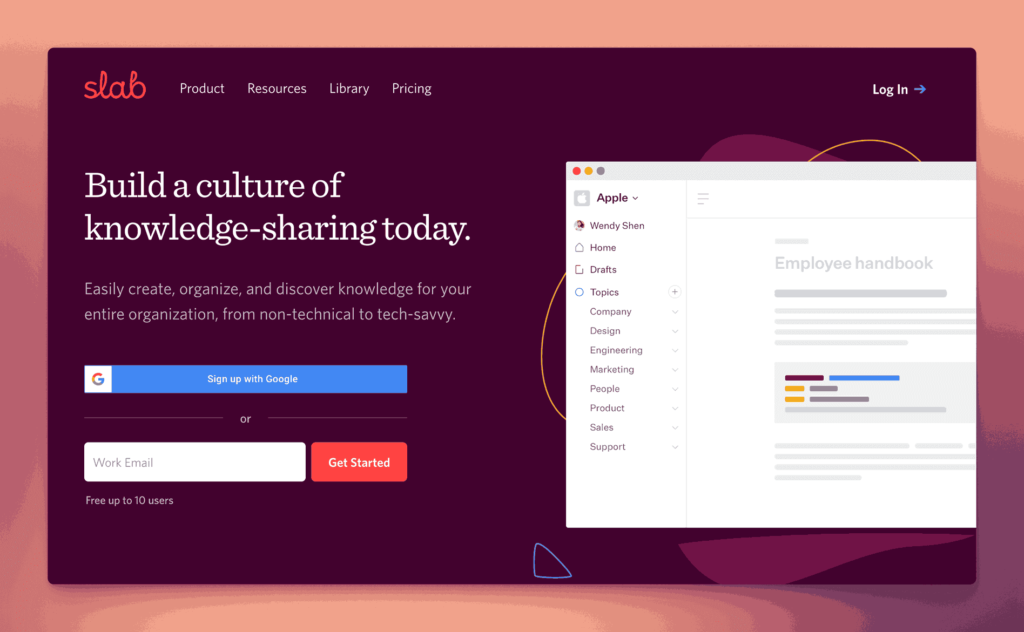
Slab provides excellent usability and modern interface design but restricts genuine enterprise SSO capabilities to paid tiers, limiting its applicability for cost-conscious enterprise implementations.
Slab excels at content creation and organization with intuitive editing tools and powerful search capabilities, though its free tier authentication limitations constrain enterprise adoption.
Key information:
- Free tier authentication: Google Workspace and Slack SSO available in free plans for up to 10 users, but SAML-based enterprise authentication requires business subscriptions.
- Pricing structure: Free for up to 10 users, then $6.67 and $12.50 per user per month for larger organizations.
Why you might consider Slab:
- Exceptional user experience with minimal learning curve and intuitive interface design.
- Powerful search functionality to quickly locate relevant content across large knowledge bases.
- Strong integration ecosystem with popular enterprise tools and workflow platforms.
- Clean, modern interface that encourages user adoption and engagement.
Potential considerations:
- Free tier user limitations make it unsuitable for larger enterprise teams.
- SAML-based SSO (Okta, OneLogin, Azure AD) and SCIM provisioning restricted to higher-tier plans.
- Advanced customization options limited without subscription costs.
GitBook (Basic SSO Only)
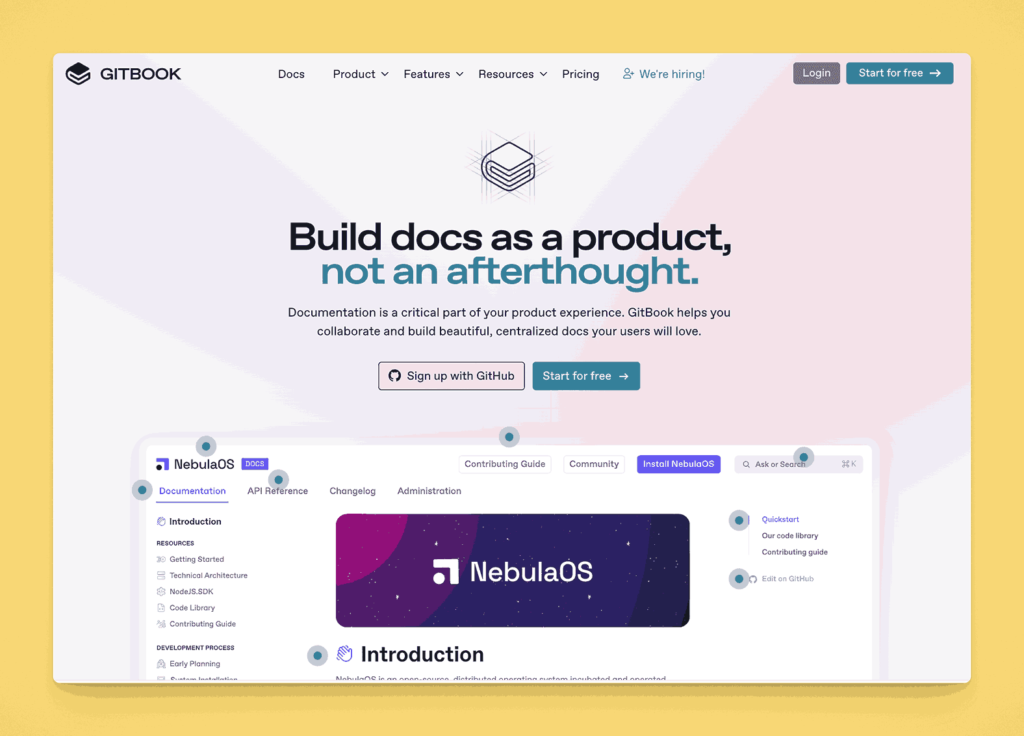
GitBook offers excellent technical documentation capabilities with modern design and GitHub integration, but restricts enterprise authentication features to higher-tier subscriptions.
GitBook particularly excels at developer-focused documentation with version control integration and technical content formatting, though enterprise authentication limitations restrict broader organizational adoption.
Key information:
- Authentication limitations: Google/email domain SSO available in free plans, but SAML authentication reserved for enterprise tiers.
- Pricing structure: Free plan available, with paid plans at $65 and $249 per site per month, plus additional collaborator fees.
Why you might consider GitBook:
- Excellent GitHub integration for version control and collaborative technical documentation.
- Modern, professional interface design suitable for both internal and customer-facing documentation.
- Strong Markdown support and technical content formatting capabilities.
- Clean, minimal interface focusing on readability and user experience.
Potential considerations:
- Enterprise authentication features restricted to expensive paid tiers limit free organizational adoption.
- More focused on technical documentation rather than broader enterprise knowledge management needs.
- Limited collaborative editing features compared to dedicated enterprise knowledge platforms.
Selecting the right enterprise SSO knowledge base platform
Choosing an appropriate enterprise SSO knowledge base requires careful evaluation of organizational capabilities, security requirements, and long-term strategic objectives. Free platforms with genuine enterprise capabilities typically require significant technical investment, while hosted solutions often restrict critical features to paid tiers.
Technical capability assessment: Evaluate your organization’s ability to implement, maintain, and secure self-hosted solutions. Platforms like BookStack, Outline, and XWiki provide comprehensive enterprise features but demand ongoing IT resource commitment.
Security and compliance alignment: Consider your industry’s regulatory requirements, data residency needs, and security standards. Self-hosted solutions provide complete control but require proper security implementation and maintenance.
Scalability planning: Plan for user growth, content volume expansion, and feature requirement evolution. Free platforms may have limitations that affect long-term scalability or require migration to commercial solutions.
Total cost evaluation: Factor hosting infrastructure, technical implementation, ongoing maintenance, training, and opportunity costs when comparing free platforms to commercial alternatives.
Implementation best practices for enterprise adoption
Research from the Society for Human Resource Management indicates that it takes new hires 8-12 months to achieve full productivity in professional roles. Effective knowledge base implementation with seamless SSO access can significantly accelerate this timeline by eliminating information access barriers.
Successful enterprise knowledge base implementation extends beyond platform selection to encompass change management, content strategy, and organizational adoption initiatives.
Pilot program approach: Begin with departments that have straightforward authentication needs and high motivation for improved knowledge management. Use pilot feedback to refine configurations and training approaches.
Integration coordination: Work closely with IT teams to understand existing identity provider configurations, compliance requirements, and any custom attributes needed for proper user provisioning and access control.
Content governance establishment: Develop clear policies for content creation, review processes, approval workflows, and information lifecycle management before full organizational rollout.
Change management strategy: Plan comprehensive training programs that address both platform usage and new authentication procedures, ensuring smooth user transition and adoption.
Why AllyMatter: Enterprise functionality without enterprise complexity
While free enterprise SSO platforms provide foundational capabilities, they often require organizations to choose between sophisticated features and implementation simplicity. Self-hosted solutions like BookStack and Outline demand significant technical expertise and ongoing maintenance, while hosted free tiers typically restrict essential enterprise features to paid plans.
AllyMatter eliminates these traditional trade-offs by delivering comprehensive enterprise SSO integration within an intuitive platform that requires no technical expertise to implement or maintain. Our solution supports both OAuth and SAML protocols with sophisticated role-based access controls, granular permissions, and complete audit trails that scale naturally with organizational growth.
Beyond authentication, AllyMatter provides the comprehensive enterprise feature set your organization needs: intelligent content organization through smart tags and metadata search, advanced workflow automation, and collaborative editing with version control. Teams can access enterprise capabilities immediately without complex setup procedures, ongoing technical maintenance, or feature compromises.
For organizations ready to move beyond the limitations and complexity of free platforms toward strategic knowledge management, AllyMatter delivers enterprise functionality without enterprise overhead.
Join our waitlist to experience comprehensive knowledge management designed for growing organizations.
Frequently asked questions
How do self-hosted enterprise platforms compare to commercial cloud solutions for SSO reliability?
Self-hosted platforms like Outline and BookStack provide complete control over SSO configurations and uptime, but require your team to manage authentication infrastructure. Commercial solutions offer managed SSO with service level agreements but may restrict customization options. Choose self-hosted if you have technical expertise and specific integration requirements; select commercial platforms if you prefer managed reliability with predictable support.
What compliance considerations apply to free enterprise knowledge bases with SSO?
Free platforms require careful evaluation of data handling, audit capabilities, and security certifications. Self-hosted solutions provide complete data control for strict compliance environments but require you to implement proper security measures. Hosted free tiers may lack compliance certifications like SOC 2 or GDPR validation. Review your specific compliance requirements against each platform’s capabilities and documentation.
Can free enterprise platforms handle complex organizational hierarchies in SSO mapping?
Advanced platforms like XWiki and Outline support sophisticated LDAP attribute mapping for complex organizational structures, including nested groups and department-specific roles. However, configuration complexity increases significantly with organizational hierarchy depth. Simpler platforms may require manual role assignment or simplified access structures that don’t fully reflect organizational complexity.
How do authentication performance and scalability differ between free enterprise options?
Self-hosted solutions scale based on your infrastructure investment, potentially handling large user bases with proper server resources. However, authentication response times depend on your LDAP/SAML provider performance and network configuration. Hosted free tiers often limit concurrent users or authentication requests, potentially creating bottlenecks during peak usage periods.
What migration strategies work best when moving from basic to enterprise SSO authentication?
Plan phased migrations that maintain user access throughout the transition. Start with pilot groups using dual authentication methods before full organizational rollout. Export user lists and role mappings from existing systems to streamline enterprise SSO configuration. Establish clear communication about authentication changes and provide training materials for new login procedures.
